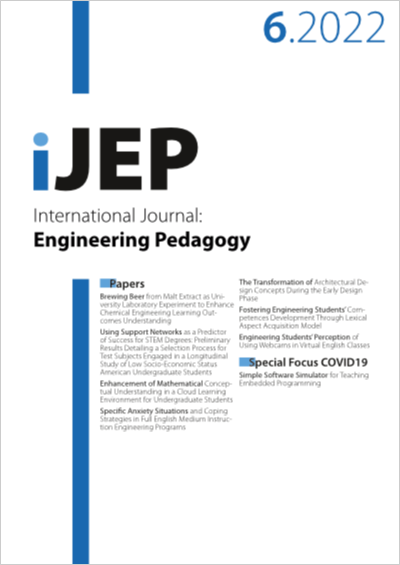Using Support Networks as a Predictor of Success for STEM Degrees: Preliminary Results Detailing a Selection Process for Test Subjects Engaged in a Longitudinal Study of Low Socio-Economic Status American Undergraduate Students
DOI:
https://doi.org/10.3991/ijep.v12i6.25547Keywords:
support networks, socioeconomic status, bias, admissions, higher educationAbstract
This study follows the selection process for participants in a National Science Foundation S-STEM grant program for low socio-economic students. State land grant institution were created to provide states with technical universities for mid- to lower-class citizens, but they have generally failed to deliver successful instruction to residential, low-socioeconomic status, underrepresented minority students. There is a need for more research on additional predictors to assess the potential of non-traditional students in the admissions process. The primary research question in this work is whether students from low-SES backgrounds possessing lower incoming metrics can still have success earning a STEM degree with the help of a web of support adults. This metrics-based selection process was generated from a five-year study of underrepresented minority (URM) students who had previously succeeded in earning an engineering degree, even though they were not originally admitted into engineering. The selection process also asked students to identify the members of their support network, how they used this support to succeed in life, and culminated in an on-campus interview. The high school metrics for these students were found to be significantly lower than their engineering peers, but the average number of anchor/mentors that were identified was 6.2. These 21 students are currently performing well and will be compared against other residential students for retention, performance, and graduation through their time at the institution.
Downloads
Published
2022-12-13
How to Cite
Baldwin, G. L., Booth-Womack, V., LaRose, S. E., Stwalley, C. S., & Stwalley III, R. M. (2022). Using Support Networks as a Predictor of Success for STEM Degrees: Preliminary Results Detailing a Selection Process for Test Subjects Engaged in a Longitudinal Study of Low Socio-Economic Status American Undergraduate Students. International Journal of Engineering Pedagogy (iJEP), 12(6), pp. 16–49. https://doi.org/10.3991/ijep.v12i6.25547
Issue
Section
Papers
License
Copyright (c) 2022 Grace Lynn Baldwin, Virginia Booth Womack, Sarah E. LaRose, Carol Sallman Stwalley, Robert Merton Stwalley III

This work is licensed under a Creative Commons Attribution 4.0 International License.


